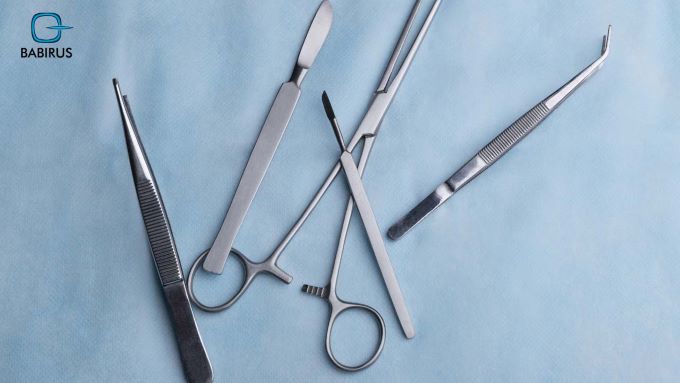Demystifying Various Types of Surgical Instruments

Surgical instruments are essential tools that help and aid healthcare professionals perform various medical procedures in the best way and achieving precise and successful results.
Thus, understanding the different types of surgical instruments and their functions is crucial for medical professionals to perform surgeries effectively.
In this article, we will talk about the types of surgical instruments, their importance, and the popular used materials in surgical instruments.
Brief on Surgical Instruments:
Surgical instruments are professionally designed tools, used by experts to perform specific functions during surgical procedures. These instruments are precisely created from high-quality materials to ensure durability, precision, and sterility.
Surgeons rely on different types of surgical instruments to manipulate tissues, cut, dissect, suture, and achieve other critical tasks during surgery.
Today, we are witnessing big advancements in surgical instruments technology and materials leading to the development of more sophisticated and specialized tools. Moreover, modern surgical instruments are designed to meet the varied needs of different surgical specialties, ranging from general surgery to neurosurgery, orthopedics, and beyond.
Materials Used in Surgical Instruments:
The used materials in all the existing types of surgical instruments must follow the restricted conditions of durability, precision, and sterility. Thus, these are the best-used materials in all types of surgical instruments:
· Stainless Steel:
Most surgical instruments are made from stainless steel due to its durability, resistance to corrosion, and ease of sterilization.
· Titanium:
Titanium instruments are lightweight, strong, and resistant to corrosion, making them ideal for delicate procedures.
· Tungsten Carbide:
Often used for tips or cutting edges of instruments due to its hardness and durability.
6 Types of Surgical Instruments:
There are different types of surgical instruments, and each one of them has its specific usage and features.
Moreover, you must follow a careful selection process to benefit from using high-quality surgical instruments in the best way.
1. Cutting and Dissecting Instruments:
These instruments are used to make incisions, separate tissues, and dissect anatomical structures during surgery. Examples include scalpels, scissors, and dissecting forceps.
2. Grasping and Holding Instruments:
The grasping and holding instruments are designed to grasp, hold, and manipulate tissues or other objects during surgery. Common examples include tissue forceps, needle holders, and retractors.
3. Clamping and Occluding Instruments:
These instruments are used to clamp blood vessels or other structures to control bleeding or create a bloodless field during surgery. Hemostats and vascular clamps are examples of clamping instruments.
4. Suturing Instruments:
Suturing instruments are used to close wounds or incisions by stitching tissues together. Needle holders, suture scissors, and various types of needles are essential suturing tools.
5. Probing and Dilating Instruments:
These instruments are used to explore anatomical structures, assess patency, or dilate narrow passages during surgical procedures. Examples include probes, dilators, and trocars.
6. Specialized Instruments:
Some surgical specialties require specialized instruments tailored to specific procedures. For example, ophthalmic surgery utilizes delicate microsurgical instruments, while orthopedic surgery may require power tools for bone cutting.
Importance of Surgical Instruments in Surgical Procedures:
Any and all types of surgical instruments have their unique impact on the healthcare professional capability to function and operate perfectly.
Therefore, we can say that the importance of the different types of surgical instruments is that they play a critical role in surgical procedures by:
- Ensuring Precision: Surgical instruments allow surgeons to make precise cuts and manipulations, reducing the risk of complications during surgery.
- Improving Visualization: Retractors and illuminating instruments improve clarity and visualization of the surgical site, allowing surgeons to perform the surgery correctly.
- Controlling Bleeding: Clamping and closure instruments help control bleeding during surgery, reducing the risk of blood loss and other complications.
- Enabling Specialized Procedures: Advanced instruments, including robotics in modern healthcare, allow specialized surgeries like joint replacements or brain surgeries, with improved patient outcomes and quality of life.
- Enhancing Safety: Surgical instruments undergo severe testing and sterilization processes, ensuring they are safe for use during surgery and reducing the risk of infection transmission.
- Reducing Surgery Time: Surgical instruments allow surgeons to perform procedures more efficiently, reducing surgery time and promoting faster recovery for patients.
Last but not least,
All types of surgical instruments play a vital role in modern medicine by enabling surgeons to perform complex procedures with precision and efficiency.
More than that, continuous advancements in instrument design and technology contribute to improving patient outcomes and enhancing the practice of surgery.
